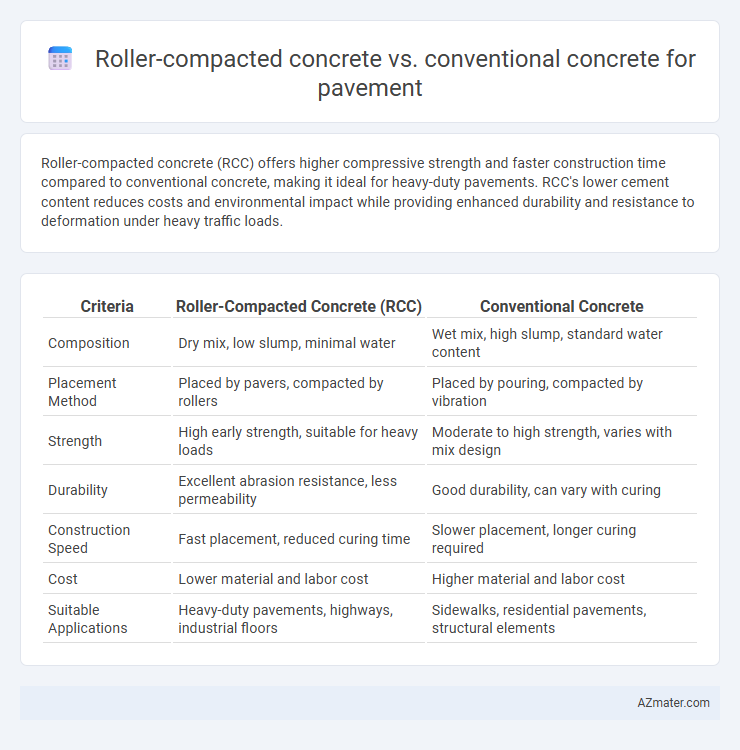Roller-compacted concrete (RCC) offers higher compressive strength and faster construction time compared to conventional concrete, making it ideal for heavy-duty pavements. RCC's lower cement content reduces costs and environmental impact while providing enhanced durability and resistance to deformation under heavy traffic loads.
Table of Comparison
| Criteria | Roller-Compacted Concrete (RCC) | Conventional Concrete |
|---|---|---|
| Composition | Dry mix, low slump, minimal water | Wet mix, high slump, standard water content |
| Placement Method | Placed by pavers, compacted by rollers | Placed by pouring, compacted by vibration |
| Strength | High early strength, suitable for heavy loads | Moderate to high strength, varies with mix design |
| Durability | Excellent abrasion resistance, less permeability | Good durability, can vary with curing |
| Construction Speed | Fast placement, reduced curing time | Slower placement, longer curing required |
| Cost | Lower material and labor cost | Higher material and labor cost |
| Suitable Applications | Heavy-duty pavements, highways, industrial floors | Sidewalks, residential pavements, structural elements |
Introduction to Pavement Concrete Types
Pavement construction commonly utilizes roller-compacted concrete (RCC) and conventional concrete, each offering distinct advantages in strength and application. RCC is characterized by its low slump and high-density mixture, enabling rapid placement and reduced construction time compared to conventional concrete, which uses a wetter mix for smoother finishes. Selection between RCC and conventional concrete depends on factors like traffic load, project timeline, and cost efficiency, influencing pavement durability and performance.
What is Roller-Compacted Concrete (RCC)?
Roller-Compacted Concrete (RCC) is a type of concrete characterized by its zero-slump consistency, allowing it to be placed and compacted by heavy rollers similar to asphalt. RCC is composed of cement, water, and aggregates with minimal or no fine aggregates, providing high density and strength suitable for pavement applications. Its rapid construction process and reduced costs make RCC an advantageous alternative to conventional concrete in large-scale pavement projects.
Overview of Conventional Concrete Pavement
Conventional concrete pavement is typically constructed using a mixture of cement, water, and aggregates that is poured and finished to a smooth surface, offering high durability and load-bearing capacity. This type of pavement is favored for its long-lasting performance, resistance to heavy traffic loads, and minimal maintenance requirements in highway and urban road applications. Due to its rigid structure, conventional concrete effectively distributes loads to the subgrade, reducing deformation and extending pavement service life.
Composition and Mix Design Differences
Roller-compacted concrete (RCC) features a low-slump, zero-slump mix design with a dry consistency, combining coarse aggregates, cement, and minimal water, enabling rapid placement and compaction using rollers. Conventional concrete for pavement incorporates a higher water-to-cement ratio, fine aggregates, and admixtures to achieve a workable, pourable mix with higher slump values, allowing for traditional finishing methods. RCC emphasizes a leaner cement paste and reduced fines content, optimizing durability and strength for heavy-duty pavements, whereas conventional concrete balances workability and strength for a variety of pavement applications.
Construction Process Comparison
Roller-compacted concrete (RCC) uses a drier mix placed with earth-moving equipment and compacted by heavy rollers, enabling faster construction and reduced labor compared to conventional concrete. Conventional concrete requires formwork, longer curing times, and precise finishing methods, which extend project duration and labor intensity. RCC's streamlined process results in quicker pavement installation and lower overall construction costs in large-scale road projects.
Performance and Durability Analysis
Roller-compacted concrete (RCC) demonstrates superior performance in pavement applications due to its high density and low permeability, which enhance durability against freeze-thaw cycles and heavy traffic loads. Conventional concrete, while offering excellent compressive strength and workability, generally exhibits higher porosity, leading to increased susceptibility to cracking and surface wear over time. Comparative studies indicate RCC's faster construction time and reduced maintenance costs, making it a cost-effective solution for high-traffic and industrial pavement environments.
Cost and Economic Considerations
Roller-compacted concrete (RCC) offers significant cost advantages over conventional concrete for pavement due to faster construction times and reduced labor requirements, lowering overall project expenses. RCC's use of lower cement content and minimal formwork further decreases material and equipment costs, making it economically attractive for large-scale pavement projects. Despite potentially higher initial equipment investments, the reduced maintenance needs and extended pavement life cycle of RCC provide long-term financial benefits compared to conventional concrete.
Environmental Impact Assessment
Roller-compacted concrete (RCC) significantly reduces environmental impact compared to conventional concrete by minimizing water usage and energy consumption during production. Its dense, low-porosity structure enhances durability and reduces maintenance frequency, leading to lower lifecycle greenhouse gas emissions. Additionally, RCC's rapid placement and compaction reduce construction time and associated emissions, contributing to more sustainable pavement solutions.
Typical Applications and Suitability
Roller-compacted concrete (RCC) is ideal for heavy-duty pavements, such as industrial yards, airport aprons, and high-traffic roads, due to its rapidShi Gong and high early strength. Conventional concrete, preferred for residential streets, sidewalks, and decorative pavements, offers greater flexibility in complex shapes and finishes. RCC's suitability for large-scale, cost-effective projects contrasts with conventional concrete's adaptability in intricate designs and lighter traffic scenarios.
Summary: Choosing the Right Pavement Solution
Roller-compacted concrete (RCC) offers faster construction times and higher durability compared to conventional concrete, making it ideal for heavy-duty pavement applications such as highways and industrial yards. Conventional concrete provides superior surface smoothness and is preferred for urban roads and aesthetic-sensitive projects due to its better finish quality. Selecting the right pavement solution depends on factors like traffic load, construction speed, budget, and maintenance requirements to ensure optimal performance and longevity.

Infographic: Roller-compacted concrete vs Conventional concrete for Pavement
 azmater.com
azmater.com